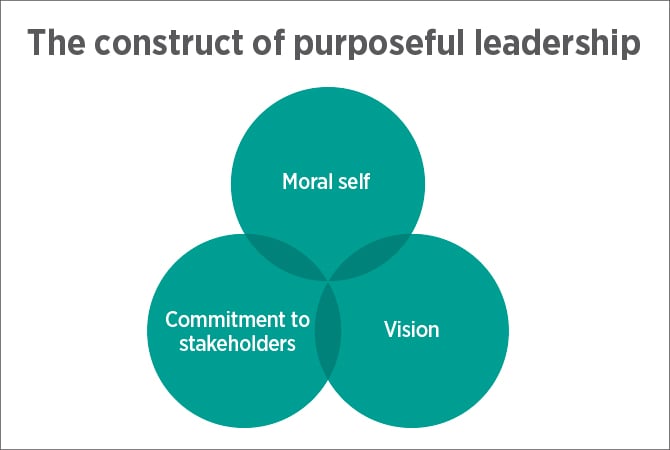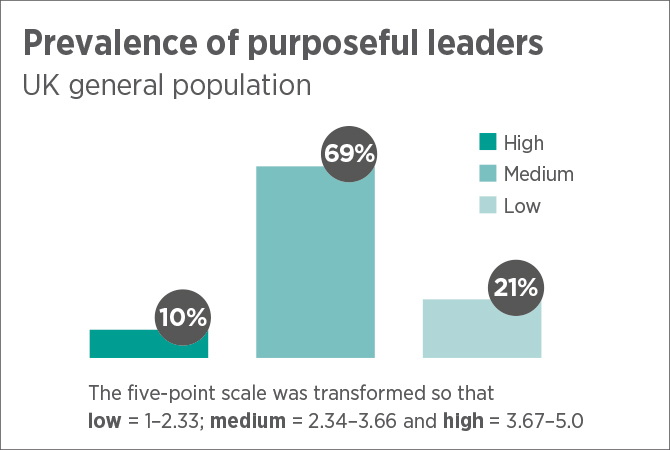There is a lot of talk about the need for purposeful organisations – ones that are values-driven and have an aspiration to deliver ethical outcomes to a range of stakeholders beyond short-term commercial gains. But very little is known about the kind of leaders that purpose-driven organisations need.

New research from the CIPD sheds light on the concept of purposeful leadership – which includes ‘the extent to which a leader has a strong moral self, a vision for his or her team, and takes an ethical approach to leadership marked by a commitment to stakeholders’ such as supporting good causes, taking care of employees, and being environmentally responsible.
The study also examines the prevalence of purposeful leaders within the UK population and draws on evidence from surveys, interviews and focus groups at five case study organisations to examine the links between purposeful leadership, ethical leadership behaviours and various employee and organisational outcomes.
Case study findings from the research show that purposeful leadership and its individual components – moral self, commitment to stakeholders and vision – are important in influencing a range of employee outcomes, including intentions to leave the organisation, job satisfaction, willingness to go the extra mile, sales performance and lower levels of cynicism; but the impact is not uniform across all organisations implying that the context these organisations operate in might be a determining factor.
The CIPD’s 2016 Employee Outlook study showed that only 21% of managers in the UK working population believe that they demonstrate high levels of purposeful leadership.

While leaders may often have an overly positive outlook on their own leadership ability, the data from followers is broadly in line with leaders’ self-assessment. As it would be difficult for followers to comment on the leaders’ sense of moral self, the survey asked followers to rate how ethical their leaders’ behaviours are instead. In the UK population four in ten workers (40%) score their leaders highly on ethical leadership.
While investigating the links between purposeful leadership and ethical leadership behaviours as observed by their followers, the study finds that the ‘moral self’ of leaders is positively linked to their ethical behaviours. This suggests that it is the ‘moral self’ of leaders that is primarily responsible for the association between purposeful leadership as reported by leaders, and followers’ observations of ethical leadership behaviours. Yet, only 8% of leaders in the UK workforce survey rated themselves highly on the ‘moral self’ component, while the majority (86%) gave themselves a medium score.
This finding emphasises that while the salience of leaders’ personal values, and their ability to stand up for their beliefs are desirable qualities in selecting purposeful leaders, the general population has a low proportion of individuals who hold themselves to high moral standards. For practitioners this signals a gap in the need and the availability of purposeful leaders.
On the flip side, 86% of leaders gave themselves a medium score on ‘moral self’. This suggests that organisational intervention into developing their moral character via bespoke leadership development programmes can be beneficial. The CIPD recommends that rather than simply relying on finding candidates with a strong moral code, employers need to invest in helping current and future leaders develop their moral code via bespoke leadership development programmes, help them understand the values of their organisations and address areas of misalignment through the right learning opportunities.
It is important for employees to feel that they are able to translate their personal moral values into the workplace environment – as one leader at a case study organisation put it: ‘I don’t see myself growing horns as I walk out of the door [home].’ However, for this to occur, there needs to be a fit between the values of the employee and those of the organisation. The study finds that the degree of alignment between the values of the organisation and those of the employee in combination with observed ethical leadership behaviours has an impact on various follower outcomes like meaningfulness of work, organisational commitment, job satisfaction and intentions to leave the organisation.
CIPD research shows that the embeddedness of values and ethics within an organisation is contingent upon their operating context - whether the organisation is in a stable environment or undergoing a period of significant change – and values fit – the degree of alignment between the values of the employees and those of their organisation and that they move across a spectrum representing the prominence of values and ethics.
If organisations understand where they are on the spectrum in terms of embeddedness of ethics and ethical behaviour and the degree of alignment between the values of the organisation and their people, they can recruit and develop their leaders to play different roles to reflect their ethical context and address any gaps.







